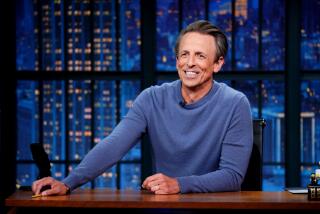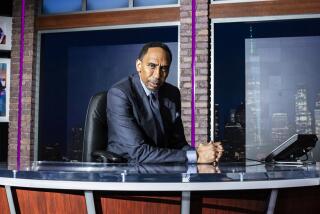Chancellor: The Last of a Breed?
- Share via
The grand era of commentary on nightly network TV news is long gone, but this week’s NBC confirmation of John Chancellor’s coming departure seemed to make it official.
A significant field once populated by the likes of Eric Sevareid, Howard K. Smith, David Brinkley, Bill Moyers and Chancellor, it now is virtually deserted, robbing the Big Three networks of yet another arena that distinguished them from the pack.
When Chancellor, 64, retires from NBC next year, it will mean that the only officially designated commentator now remaining on the weeknight news broadcasts of the Big Three will be gone--unless the network decides to replace him.
And one can only hope for a revival of the form, because good commentary is the perspective--and often the conscience--that fleshes out the facts and gives a TV organization a distinctive voice and face.
Chancellor, whom NBC said on Thursday will continue his commentaries until he leaves, is not of the school of fire and brimstone. He is just about as moderate and middle-of-the-road as a commentator can be. Still, he is a voice, and a reasonable one.
“He’s been pretty damn good,” said Brinkley, the former NBC anchor and commentator who now has a successful series on ABC, “This Week With David Brinkley.” But asked about the state of network commentary in general, Brinkley added:
“I would say that it is very sad, weak, wan, sick and almost not there.”
Where the voices of the great nightly commentators once spoke quietly, if passionately and in erudite fashion, their modern television counterparts are the glitzy, louder pontificators who flourish on TV’s endless collection of hyper, high-pitched talk shows, taking their cue from Geraldo Rivera and Phil Donahue.
It is not progress.
Smith holds out some hope that commentary on the evening news eventually will be revived: “I think they’ll revert to it because it helps. Without it, programs are somewhat two-dimensional and tend to get a little flat.”
Sevareid, regarded by many as the foremost practitioner of TV commentary during his years with Walter Cronkite on CBS’ nightly news, said: “It’s sad they don’t have much of it now. There’s very little of a reflective nature going on, especially since Bill Moyers left (CBS).”
Added Sevareid: “I always thought there should be more than one commentator on a given network. It’s sort of a monopoly position, you know. If there were a couple changing off, it would be better, but I was stuck with it, so I did the best I could.”
Sevareid’s trademark was his dispassionate, superbly honed, granite-like blend of analysis and interpretation that veered away from editorializing.
William S. Paley, the late CBS leader, wrote in his 1979 book, “As It Happened”: “CBS has strictly forbidden editorializing by our regular newscasters.”
“Yes, I tried analysis,” says Sevareid. “There’s a difference between objectivity and neutrality. If you approach things objectively, people put up with it. They think you’re being honest, rather than one man blabbing out his personal opinions night after night. That’s easy, you know. Opinions are a dime a dozen.
“What’s important are ideas, ideas that have a chance of working. You have to think hard. It takes a lot of hard writing and scholarship, and there’s not much of that around.”
As an indication of the special place that prominent commentary once had on the nightly network news, author Alex McNeil writes in his reference book “Total Television”:
“Cronkite’s conscientious efforts to maintain objectivity and to separate news reporting from news advocacy were epitomized by the show’s closing during the Sevareid years (which ended with his retirement in 1977). Cronkite’s familiar benediction, ‘And that’s the way it is . . . ‘ was deliberately omitted on those evenings when Sevareid’s commentary was scheduled as the final item of the ‘CBS Evening News.’ ”
To be sure, commentary abounds in various venues of TV. Ted Koppel, in his quiet way, makes statement upon statement through his interviewing technique. The same with Brinkley. All of the Big Three anchors--Dan Rather, Peter Jennings and Tom Brokaw--get in their two cents’ worth now and again.
Andy Rooney pops off on “60 Minutes.” Bernard Shaw of CNN has the authority to make his thoughts known. CBS’ Charles Kuralt and Bruce Morton also weigh in. PBS, where Moyers now works, has its say-sos through him and on such outings as “The MacNeil/Lehrer NewsHour.”
There is more. But the value of highlighting the nightly TV news with the views of respected voices sadly seems lost on the Big Three as they take on a sameness and fade into the woodwork.
And how nice it would be if conservatives, who have been virtually shut out as commentators on the nightly network news, finally had a shot. When conservative George Will was hired by ABC, there was talk that he would be a nightly news regular, but it didn’t pan out.
Here in Los Angeles, the value of TV commentators has been abundantly clear. The late Bill Stout gave KCBS Channel 2 something that set it wonderfully apart for the few minutes he was on, even in the station’s worst days. He gave it a certain prestige it often didn’t deserve.
Over at KCOP, regular commentator Bill Press probably has a higher profile than the station’s anchors. KABC Channel 7, over the years, has presented commentators with opposing political and social views. And KCBS is continuing its commentary with Michael Tuck.
By and large, however, radio, from Rush Limbaugh to Michael Jackson to Tom Leykis, has become the seat of influential day-in and day-out commentary, analysis and opinion in broadcasting.
Even CNN, the heart of TV news, suddenly had its flank exposed when Moyers delivered some brilliant guest commentaries for the cable network during the Gulf War, illuminating what the channel was lacking and needed most.
Brinkley, whose terse commentaries were textbook models, nonetheless has reservations about the form, feeling there isn’t enough time to do justice to many subjects and that opinions alienate much of the audience. His view: “I think the value of journalism lies in telling people what happened.”
And there is this: Will viewers sit still for thoughtful analysis at a time when the impact of tabloid TV is undeniable?
You never know unless you go for it. In Los Angeles, voices heard in the recent riots are still not represented as opinion-makers on local TV. Both here and on the network level, trusted nightly commentators would seem to be invaluable commodities at a time when worried viewers are looking for answers.
There is always a new generation of Sevareids, but you have to give them a chance.
More to Read
The complete guide to home viewing
Get Screen Gab for everything about the TV shows and streaming movies everyone’s talking about.
You may occasionally receive promotional content from the Los Angeles Times.






